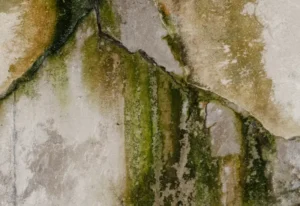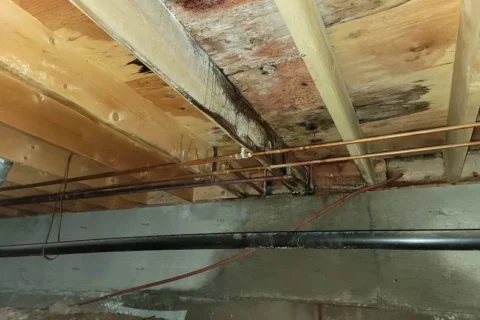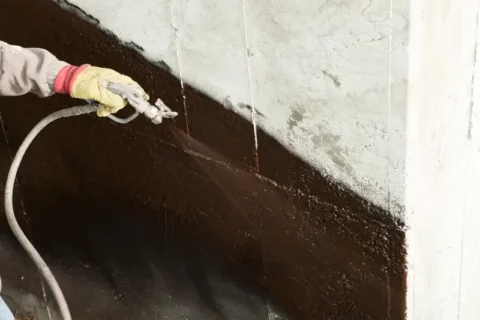How to Prevent Mold in Basements
 The basement is an important part of any home. Some people use theirs for a spare bedroom or home office, while others make the most of the extra storage space. But no matter how you use your basement, the last thing you want is mold growth. This unwelcome guest not only damages your basement but can also affect your health. At Everdry Waterproofing of Wisconsin, we’re dedicated to helping Milwaukee, WI homeowners identify mold and seek practical solutions. Let’s dig deeper into basement mold control strategies.
The basement is an important part of any home. Some people use theirs for a spare bedroom or home office, while others make the most of the extra storage space. But no matter how you use your basement, the last thing you want is mold growth. This unwelcome guest not only damages your basement but can also affect your health. At Everdry Waterproofing of Wisconsin, we’re dedicated to helping Milwaukee, WI homeowners identify mold and seek practical solutions. Let’s dig deeper into basement mold control strategies.
Basement Mold Types
Mold comes in several varieties, each with its own appearance and effects. Here are the basics of some of the most commonly discussed types of basement mold:
- Alternaria—This cotton-like mold often appears black, brown, or gray in color.
- Cladosporium—Cladosporium is often black or green and tends to take hold on fabric surfaces.
- Chaetomium—This mold type looks white and fuzzy but can darken in color if not addressed quickly.
- Aspergillus—Another common type of basement mold, aspergillus can become airborne and cause serious infections. It comes in a range of colors, including black, white, yellow, green, and brown.
- Stachybotrys Chartarum—You might know this one better as black mold. Black mold most often occurs around leaky pipes and can lead to major respiratory problems.
What Does Basement Mold Look Like?
Basement mold can appear in a variety of colors, textures, and shapes, depending on the variety. Black, green, white, and gray are among the most common colors, and some spots of mold growth can appear fuzzy or slimy. Other types might have a tar-like appearance or resemble a powder. Looks aren’t the only way to recognize mold, though—it’s usually accompanied by a musty odor. If you notice discoloration or odd smells in your basement, be sure to schedule a mold assessment.
Can Mold in Basements Affect the Upstairs?
Yes, mold in the basement can indeed affect the upstairs areas of your home. Mold spores are microscopic and can become airborne, traveling through vents, stairwells, and cracks in flooring or walls. Once these spores spread, they can settle and grow in other areas with high humidity or dust. What’s more, the air circulation system in your home can inadvertently transport mold spores to other rooms and cause allergic reactions and respiratory distress. Addressing mold in the basement promptly is critical to preventing it from spreading upstairs.
Is Mold in My Basement Dangerous?
Allowing mold to grow and fester without professional treatment could put your family at risk for weakened immune systems, respiratory problems, and even cancer. In addition to adverse health effects, unmitigated mold growth can lead to structural instability, as it eats away at wood and drywall.
How to Prevent Mold in Your Basement
The best way to deal with mold is to avoid excess humidity and water seepage in the first place. Here are our tips on how to mold-proof your basement walls:
Control Humidity Levels
Mold needs moisture to survive, and a humid environment makes the perfect breeding ground. To stave off mold growth, be sure to keep your basement’s humidity level below 50%. Try these approaches for controlling humidity levels:
- Use a Dehumidifier—Place a dehumidifier in your basement to reduce moisture in the air. Make sure to empty and clean it regularly.
- Ventilate the Space—Open basement windows when weather permits, or install exhaust fans to promote airflow.
- Seal Cracks and Gaps—Check for cracks in walls or floors that allow moisture to seep in, and seal them with waterproof caulk.
Waterproof Your Basement
Investing in basement waterproofing solutions can save you the headache of dealing with a damp basement. The team at Everdry Waterproofing of Wisconsin can take a look at your property and recommend solutions such as leak repair or installing a sump pump.
Improve Drainage Around Your Home
Have you seen water pooling around your home? This can mean mold growth is in your future. Improve the drainage on your property with these measures:
- Clean Gutters and Downspouts—Keep gutters free of debris, and extend downspouts at least 3 feet away from your home’s foundation.
- Grade Your Lawn—Ensure the soil slopes away from your house to guide water flow away from the foundation.
- Install French Drains—If water pooling persists, consider installing French drains to redirect groundwater.
Inspect Regularly for Signs of Mold
Early detection can save you time and money in the battle against mold. Here’s how to test for mold in basements:
- Perform a Visual Inspection—Look for visible signs of mold, such as discoloration, black or green patches, or fuzzy growth on walls, ceilings, and floors. Pay close attention to damp or dark areas.
- Check for Musty Odors—Mold often has a distinctive musty smell. If your basement has an odor that persists despite regular cleaning, it could indicate hidden mold.
- Use Mold Testing Kits—Home mold testing kits are available in hardware stores and online. These kits allow you to collect samples from surfaces or the air in your basement for laboratory analysis.
- Hire a Professional Inspector—For more accurate results, hire a professional mold inspector. The mold assessment team at Everdry Waterproofing of Wisconsin uses advanced tools to detect mold that may not be visible.
Choose Mold-Resistant Materials
When furnishing your basement, be sure to use materials that resist mold. We recommend avoiding carpeting and opting for tile or vinyl flooring instead. Carpets can trap moisture and lead to dampness that attracts mold. Our team can also point you to mold-resistant drywall and paint to ensure your basement never endures mold growth in the first place.
Store Belongings Wisely
Storing your belongings wisely is the final part of basement mold control. How you store your items can significantly affect where mold is allowed to grow. We suggest using shelves or pallets to keep belongings off the floor. Consider storing things in plastic bins instead of cardboard boxes as well. Taking both these precautions can save you from damaged belongings and a big headache later on. Once your items are stored well, don’t forget to declutter occasionally. Storing only what you need helps avoid overcrowding and improves airflow.
Concerned About Mold? Give Us a Call
By taking preventive measures, you can keep your basement dry, clean, and mold-free. As you work to keep your basement in top shape, count on Everdry Waterproofing of Wisconsin for help. We handle a range of basement waterproofing services, including mold assessments. Get in touch with us today for details about how we help Milwaukee homeowners.
Ready to Get Started?
Contact Us Today to Schedule a No Pressure, No Obligation, Free Quote!


